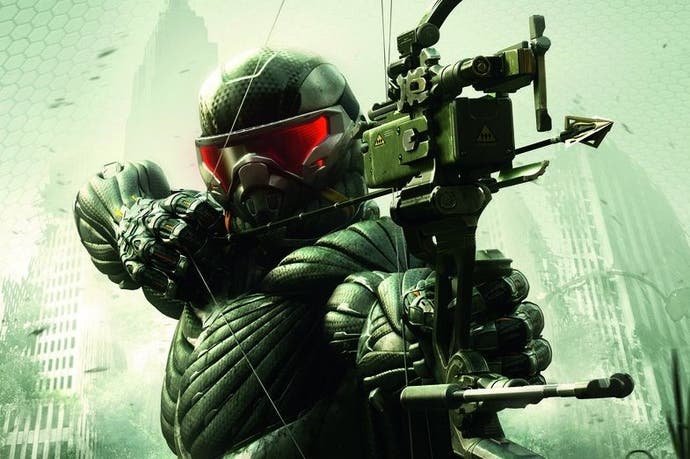"The transformation was painful. We paid the price"
Crytek boss Cevat Yerli on unpaid wages, Ryse 2 and the future.
It's been tough at Crytek this year.
In fact, we've heard developers at the company's vast network of studios, who are responsible for the likes of first-person shooter Crysis, gory action game Ryse and, as of a month ago, Homefront: The Revolution, first noticed something was up as early as 2012.
In truth Crytek has had its ups and downs throughout its 15 year history. But this year was perhaps its most dramatic down, with reports of staff going unpaid for months on end, the cancellation of Ryse 2 and vociferous criticism of its focus on free-to-play.
Reports indicated Crytek was close to bankruptcy as it worked to secure investment that would guarantee its future. Then, last month, management announced Crytek had received backing from a mysterious benefactor and all was well again. Following that, the sale of Homefront and Crytek UK to publisher Deep Silver - a move we understand had been in the works for some time and staff at the studio were hoping for after a stressful 12 months.
Digging deeper, we discover Crytek has also downsized its Austin, Texas studio, shifting development of Hunt: Horrors of the Gilded Age to its headquarters in Frankfurt, Germany, leaving what was once the continuation of the Darksiders development team to support companies using Crytek's CryEngine technology. Whatever the press releases say, it's clear Crytek has cut costs and has reduced its staff count, which at one point was a staggering 950 spread across nine studios.
Throughout all this the people at the top of Crytek refused to speak to press - until now. Here, in an exclusive and extensive interview with Eurogamer, Crytek founder and CEO Cevat Yerli finally discusses the troubles at his company, defends his policies and personal management style, and explains why he's sticking with free-to-play. Read on for Crytek's plans - or lack of - for Timesplitters, Crysis and Ryse, as it switches from being a game developer to a game service.
What's the state of the company at the moment?
Cevat Yerli: We have been undergoing a transformation, just like the whole game industry. Part of the transformation was of a financial nature, part of it was of a strategy nature, and part of it was of a reorganisation nature. The shift from retail products towards a game service, that's the one we are undergoing. As a result of this we have adjusted our entire strategy across the board for each game. We evaluated the games and looked at which do not fit in this strategy. This required additional investment, which led to temporarily diminished capital resources. But we are today fully prepared to deliver a game service. From a strategy perspective we are financially equipped towards that. And we have restructured the studios so we focus on Frankfurt, Sofia, Kiev, our Asian operations, and Budapest, towards delivering our strategy.
Regards to Austin, we have downsized Austin to be our US hub for the engine business, and brought over Hunt to Frankfurt. Then in the UK we sold the Homefront IP as well as the Homefront team, which was pretty much the majority of the team, to Koch Media. That helped us in two ways: it was a strategic sell as well as downsizing costs so we are better equipped towards a future of games as a service.
What was the main cause of the financial difficulties Crytek found itself in?
Cevat Yerli: The primary cause was the transformation. We're observing where the industry is going. We knew free-to-play or games as a service - online services in general - will become the future of gaming. We've known this for a while. But we were finishing up our retail games or still had them in development, with Homefront for example.
But that shift required a whole different capitalisation, as well as additional talent pool and different types of spending and forecasting. All of that caused temporarily diminished capital resource, which we have now overcome. This was the main cause of the situation - the whole transformation of Crytek.
I remember it was a couple of years ago when you said Crytek would be a free-to-play only company. Why did you then have Ryse and Homefront in development if you were doing that?
Cevat Yerli: If you look back, we started with one title, Far Cry. Then we moved to Crysis. Then multiple platforms and then multiple studios. In order for the company to transition, we still had to take into account the retail market in the meantime. We couldn't just go 100 per cent full blown into free-to-play immediately.
So in a sense we used these titles to transition out of these markets. And the transitioning out is still not finished. We're still committed to retail this year and some of it will be next year. You'll hear of that soon. But the majority of our game launches this year are already games as a service, and will be more and more so in the coming years.
This transition, even though it was done as soft as we wanted it to be, we underestimated some of the additional investment required for that.
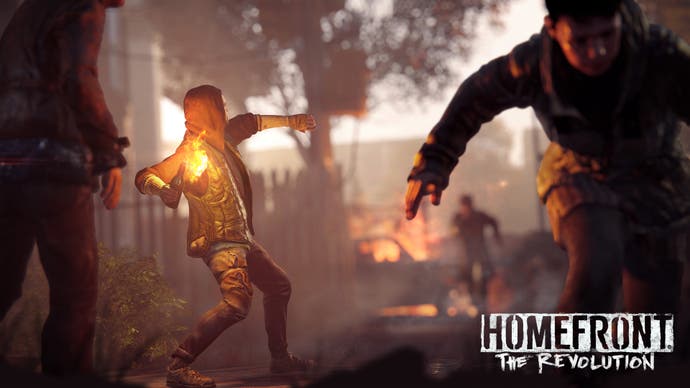
Just so I'm clear, why did you sell the Homefront IP and the team to Koch?
Cevat Yerli: Homefront's timeline, as well as the focus as a studio we would have needed to put behind that, would have been detrimental to the transition to us. That was the comparison: are we delaying the transition further, or are we going to do it earlier than later?
We believe in Homefront. It's a great game and we still believe in it. But we made a deal with Koch we felt comfortable with as a strategic sale of the asset, which everybody comes out of in a win/win position.
Just to try to understand what you're saying, you think it would have taken too long to develop and as a result would have been too costly a product?
Cevat Yerli: I don't want to comment on cost, but given our strategy and the focus we need right now as a company this year, launching Warface, Arena of Fate and Hunt within the next 12 months, those three games need full attention for us. Homefront would have taken a lot of attention from top down of the company across Frankfurt, UK and many more. That kind of commitment would have come at the price of focus towards the other gamer services.
We looked into an opportunity for how we could turn this into something which is in the best interest of Homefront and our other games. And then by discussing with Koch we came to a strategic sale that created a win/win situation for everybody.
In the case of Hunt and the Austin studio, you only established that fairly recently. So the downsize came as a surprise.
Cevat Yerli: This was a slightly different story. A team always hinges on leadership. There were two problems. One, we need to have strong leadership in place for every studio. Just around the time we finalised the deal that brought us back to where we needed to go, there was a discussion with the studio heads about what would be the situation at the studio. We came to an agreement this wouldn't make sense for Austin because of the cost factor, the burn rates and the development costs are high in Austin compared to what we have within Europe.
So we agreed with the management there to part ways, and refocused the Austin office towards an engine business that is viable, because we have quite a few significant marquee titles out of the US that are taking support from our Austin operation. And then we decided to put some of our best people in Frankfurt on hand to make sure we do justice to the quality the Austin team has done so far, which is a very high quality. But also it's closer to the mothership and our technology R&D, so Hunt can get more attention and love from a tech perspective.
We're happy with where the gameplay is and the atmosphere. We have an experienced game director and executive producer. So we feel within our transition period this was the best choice we could have done for Hunt.
When the studio was founded did you not realise the cost of development in Austin would be high?
Cevat Yerli: To be honest, what we had forecast for cost and what we accrued was much higher. The forecast we received back then and the reality were off by a high margin.
Why were they so off?
Cevat Yerli: Things change. Costs change. Don't get me wrong, it was off, but this was not the sole reason. You never make a decision based on only one factor. The team did a great job in Austin, but in agreement... it wasn't something like, we said to the team, guys, this is what we want to do and you don't have a job any more. Rather, we talked about this. And eventually it was proposed and discussed with the executive management there that this is the best choice for Crytek. It wasn't something we imposed on the team. It was something we concluded was the best choice for Crytek.
I want to clarify: this wasn't a pure cost decision. This was a decision about being cost sensitive, but also - very importantly - closer to the mothership where there are more resources available. And the CryEngine team is now close to the Hunt project, allowing it to be a proper high quality PC title.
I've spoken to a few dozen former and current Crytek developers who were upset about unpaid wages. Can you explain that situation?
Cevat Yerli: How exactly?
First off, why did staff go unpaid?
Cevat Yerli: You have two choices, right? Either you delay payments - again delay... it's not that they didn't get paid, they got delayed - delay payments and salvage the company. Or, you push your cash flow directly to the studios and you file for insolvency. Both options are really bad. So you have to make the better of the two bad decisions.
However, like we had promised to everybody - and we said the company is not at a big risk, not a danger, it just needs more time to salvage it and that's what we did. Now, everybody got paid plus inconvenience payments additionally to that, like we promised everybody.
Some people were very impatient and got angry at the smallest delay. Also, there was a critique of us not being proactive in communication, which we don't understand, because we had been frequently in the UK as well as every other studio, talking about potentially rough times. And we had even shared with people how they should maybe work with different banks at a personal level to prepare. Or, if not, they could make a choice to resign and look for other jobs.
But our priority was to not downsize the company. Our priority was to not let anybody lose their jobs at that point. Because if a company gets into a difficult situation and you know the outcome is going to be bad, you have the choice to downsize everything. But we haven't done that because we wanted to keep everybody tied together as a team.
I was surprised and upset a little bit that the intention of us keeping together everybody upset a few of them. But I understand that situation. Some people live in very tight financial planning. That's their own privacy. They can do whatever they want. Those guys, when they get under pressure it can become emotional. We tried to individually help out. Like if somebody gets in trouble they can talk to us directly so they don't get under pressure. We tried whatever we could do. But you can't make it right for everybody.
One thing I heard there was an erosion of trust because of a lack of communication. And in the press release you put out you did acknowledge a failure of communication with your teams.
Cevat Yerli: There are expectations from some staff that aren't realistic. There are expectations, for example, that we reveal the entire situation of any deal, any cash flows and P&Ls and things like that. You can't do that. That's internal. Even our investor doesn't have that level of access to be honest.
So what I want to say is, you can't make it right for everybody. The only upset we received has been from a few people. I don't want to blame the UK office as an entirety, because we're talking about a few people within the UK. The majority of the UK office, as well as any other studio, have been loyal and committed to us. These few people who brought up this topic I heard numerous times now, that we haven't communicated well, I don't know who those few people are and it doesn't really matter. I can't and I won't ever judge a team just because a few members talk bad about us.
I've also spoken with some of your developers who have accused you and the other upper management of arrogance. I heard you went to the UK studio and told them they were lucky to get paid. What do you say to that?
Cevat Yerli: I have never ever used these words before. This is complete bullshit. I would never ever say to somebody, hey guys, you're lucky you got paid. What we have communicated to the team is, we have two choices: either we let people go immediately and pay the remainder, or we can't pay you right now and we stick together. We chose - for the team itself - for this reason not to downsize. And the majority of the team has applauded this, rather than critique. We would have never ever said, hey guys, you are lucky you get paid. If you were arrogant like that you wouldn't be in this business for 15 years now. And people would not be loyal to us and sticking with this, like the majority of Crytek is right now.
I understand that, but your staff see that you guys have done well out of the business while they struggle because they're not getting paid.
Cevat Yerli: We didn't get paid, too.
Do your staff know this?
Cevat Yerli: Yes. At least they know in Frankfurt. And further, by the way, we also all put private money in. As much as we could. As I said to all of the teams, we were all in. That preconception that we have been doing well out of the situation, obviously it's our company, but at the same time we were all in. As much as one can be.
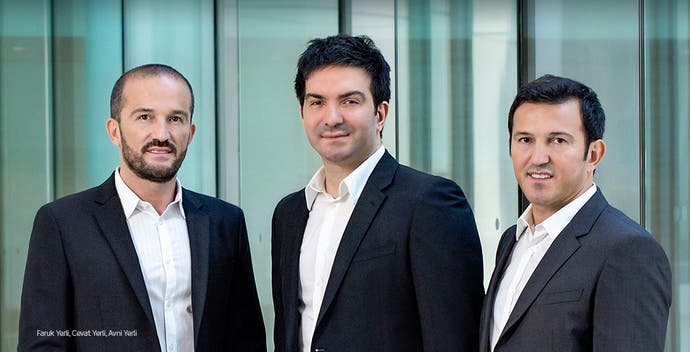
How many people is Crytek right now?
Cevat Yerli: Maybe 700.
That's following the Crytek UK sale and Austin downsizing, right?
Cevat Yerli: Yes.
I'd heard you were about 900 to 950.
Cevat Yerli: Yes. We're still in the process of reorganisation. But I'm happy with where we're going and with our focus. In this 700 people it's not like we're just developers. There are quite a few other departments that operating, marketing and publishing.
Do you anticipate losing more staff? Do you anticipate further selling of studios or IP?
Cevat Yerli: Selling studios I would think is not going happen any more. But anything else I can't say right now. My gut feeling would be maybe not, but I just can't say.
Can you say where the money came from?
Cevat Yerli: No, we can't go into details.
Why not?
Cevat Yerli: The partner and us have to agree when to announce it.
Has Crytek been bought or is it an investment?
Cevat Yerli: It's not an investment and Crytek has not been bought. It's revenue. It's purely revenue.
It's a revenue deal?
Cevat Yerli: Yeah.
If it's a revenue deal how did you get the cash injection to pay staff?
Cevat Yerli: It might be a larger revenue deal. Like a big one.
So you got cash up front.
Cevat Yerli: Usually our deals have cash up front. Yeah.
When will you announce it?
Cevat Yerli: I have no idea. There are no other details I can give you.
Can you say this deal means Crytek is safe?
Cevat Yerli: Absolutely. I can say that.
How close to going out of business were you? Or going bankrupt?
Cevat Yerli: Out of business or bankruptcy in my mind was never the case. We have tried to communicate this as much as we can to everybody. But I understand some employees of Crytek have been in other companies under similar situations and they have gone out of business. We have a lot of substance in Crytek. That revenue deal just underlines how much substance we have. We didn't need to sell and we didn't need an investment. We just even by securing a revenue deal saved Crytek - in your words.
But you still needed to offload Homefront and Crytek UK.
Cevat Yerli: No. We didn't need to do this. We didn't need to downsize our company. Maybe this didn't come across. We didn't need to sell Homefront. That deal would have secured Crytek's future even if it would have added another 100 people on top of where we were before we sold Homefront or changed Austin's direction. It is an optimisation stage that we said we should do strategically right now in order to focus short term our mindset on the launch of Warface, Arena of Fate and Hunt. It wasn't a pure commercial deal. It was a strategic deal for focus. We didn't need to sell Homefront or the UK office.
Can you understand why it looks like you did? The fact that staff went unpaid and there were problems with cash flow, surely you can see why people would think you did need to sell Homefront.
Cevat Yerli: Yeah, sure. We started discussing the Homefront Koch deal during this period. We didn't see a reason why not to do the deal, even after we signed the revenue deal. Even when we signed the revenue deal we looked at the Homefront deal again to see if it still made sense. Would we still sign this deal under a different context that had changed by that time? The context was, prior to the revenue deal then after the revenue deal. And still the decision was, yes, it's still better for Crytek and for Deep Silver and for everybody involved, because we can focus from top down and bottom up on making Warface, Arena of Fate and Hunt successful in the short to medium term.
I guarantee you this is the case. if anybody contradicts... I can understand there might be this perception, but it is guaranteed not the case we had to downsize. We didn't have to downsize. And we still don't have to downsize.
But did you have to not pay your staff?
Cevat Yerli: Yes. We communicated delays. And we knew the delays would be caught up.
You understand the anger when you don't pay staff, right?
Cevat Yerli: Only a few people were like this. The majority of the UK team did a great job and they were loyal. I want to say, our focus always was to not change anything, but only do it if strategically it's the best going forward. And that's what we have done. This was not a reaction to anything related to the UK. We highly respect the team still. I always spoke highly of the UK office. I always thought they were some of the best people we worked with.
Crytek's reputation has undoubtedly been damaged through all of the negative reports about unpaid wages. Are you concerned this will affect your business?
Cevat Yerli: Surely it will to some degree. But I hope through communication we will have more frequently people and gamers will understand through our words and actions we have the best interests of PC gamers. At Gamescom we will show off our games. With online services we will be equipped to better react than ever before to communities and gamer demands. That's ultimately what we want to build - the best experiences driven by the community.
That transformation was painful. We paid the price. Now we come out of it much stronger. I hope people will see through our games these are not just empty words.
What about your personal reputation? You have been heavily criticised and accused of mismanagement.
Cevat Yerli: I don't want to defend myself because defending myself would imply me talking good about myself. Let me say it this way: if I really was a bad person I don't think Crytek would have such a loyal base. Are some people upset? For sure they are, because they have been let go. Am I making the best choices? There's certainly room for improvement. Can we learn more? Sure. Every day we try to improve.
I read those comments and unfortunately I don't have channels to communicate with them more clearly, apart from press interviews right now. We make mistakes. We are human. We wake up, go to our job, eat like everybody else, then go to sleep. In general we are flawed. If I did say something in the past that came across as arrogant, maybe it's because I don't speak the native language. But I don't mean to offend people. I just mean the best for people.
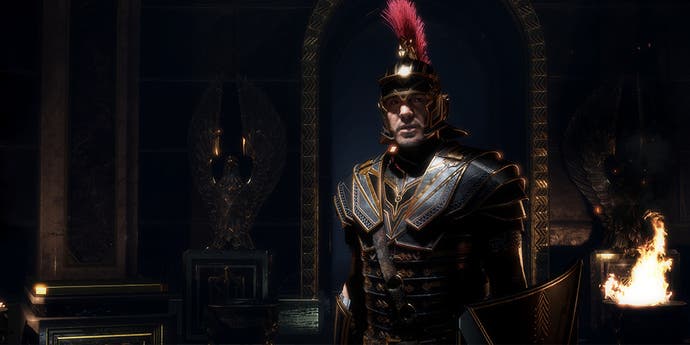
I'd like to move on to Ryse. It began life as an Xbox 360 Kinect game before you moved development from Budapest to Frankfurt and switched it to an Xbox One launch title. I've heard that the development was troubled. Now the dust has settled on the release, how did it perform?
Cevat Yerli: Ryse is in the forecast of what Microsoft has always shared with us, and we didn't expect more than that. Our goal always was for Ryse to be at the forefront of a next-generation console launch, which we have done. Ryse has received tremendous promotion and IP awareness. And Ryse is our IP. We do what we want to do with the future of Ryse. This is important.
There were rumours saying, hey, there were penalties if you don't release. This was all bullshit. We had agreed with Microsoft to put it out on time. In fact, we had conversations from Microsoft to us, telling us, guys, do you want to push out the game? We wouldn't be offended by that. But when we let the team choose - not the management - when we asked, guys, do you want to try to get it done by Christmas or do you want to take a few more months time, unanimously they team decided to go for the launch window of a console because that's something emotional to be a part of. To be part of an event like that, you do it once every five to 10 years. So everybody was pushing towards that. This was not an executive decision. We had a very good relationship with Microsoft on the launch of Ryse. And I would at no point want to miss that again. So if people ask me, would you do it again? I would, because the team was excited for that.
But the game originally wasn't going to be an Xbox One title. It was an Xbox 360 Kinect game.
Cevat Yerli: Yeah, but this has nothing to do with that. This was a mutual decision. We just changed course. Not because the game was troubled, but because we chose to make it a launch title for the new console of Microsoft.
So you're saying there wasn't a troubled development? Because I've heard from a few people there were significant problems with it and Microsoft almost pulled the plug.
Cevat Yerli: There is never a not troubled development. Let's be realistic. Far Cry was troubled. Crysis was troubled. Every game that wants to say it's a high quality product will have challenges that are unpredictable towards the last nine months of the project. This is the reality. And as a launch title the trouble comes from the fact that there are - there are NDA-related materials I can't talk about - but the platform is being built at the same time we are building the game.
So, was it challenging? Definitely Ryse was one of the most challenging I have been involved in. And I have been involved from Far Cry forwards. It was a very tight development and definitely had its troubles. But are looking back at is a proud achievement. That's what matters at the end of the day.
There were people saying, Crytek put them to crunch and unpaid... no, we do not make unpaid stuff. Never. We always offer the teams extra bonuses or extra vacation days. We run a company where the management on the projects decide how long certain things take, or when we want to finish this. Not the executive management. This is very important. It's a bottom up approach, not a top down approach.
For example, for any feature of a game: how long do we need for this? The management asks the team. The team responds. Then the project management says, we think we need this amount of time. The result of that is the project schedule. It's not a top down approach where I say you have to finish this game in this timeframe. It doesn't work like that. That's important to understand, and goes back to the thing about arrogance. We would not be in this business if we were not collaborative and a part of the team.
We've heard you had the option to do Ryse 2 with Microsoft, but they wanted ownership of the IP, but you didn't want to let it go. The collapse of that deal seems to be one of the things that sparked the financial problems Crytek has had.
Cevat Yerli: No. We have a good relationship with Microsoft. We are constantly looking at what we can do together. We are not 100 per cent happy with Xbox One sales right now. So we want to wait till the current gen and next gen catches up. For Ryse 2, we aren't saying it's cancelled. It's our IP. It just has to wait for the right timing. And the right timing means higher installed base across next-gen.
Does it have to be an Xbox exclusive, or can you release it on PlayStation? Can you find another publisher, or does Microsoft have to publish it?
Cevat Yerli: No. We can do whatever we want with it with whoever we want.
So what's stopping you from trying to find a publisher for a sequel?
Cevat Yerli: Focus and attention. I'm not saying it's not going to happen. Look, Ryse was maybe not the best rated game, but what we achieved for launch was a great foundation for us to build up. I know there are a lot of gamers who are contacting me through different channels who want to see Ryse 2. There is a lot of positive feedback. We're considering it. But at this point there is nothing official I can talk about.
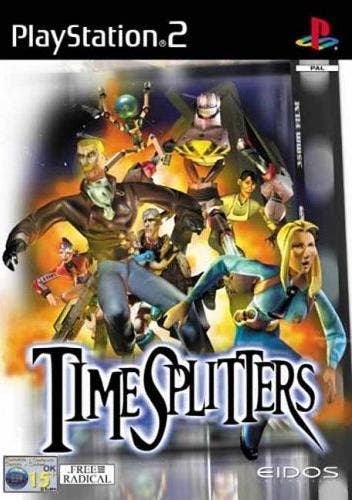
You sold Homefront and Crytek UK but kept hold of the Timesplitters franchise. Do you have any plans at all to do anything with Timesplitters?
Cevat Yerli: At this point we don't have any plans with that because we are focused on our development and operation of our current projects that are announced. I still personally love Timesplitters and there might be a good chance of something in the future. We have some creative ideas. In fact the UK operation at one point planned to resurrect Timesplitters. But that has now changed. So we will figure out something definitely for Timesplitters, but the time has not come yet.
Would you commit to the free-to-play mantra you talk about for that?
Cevat Yerli: It's too early to decide. Look, we are running a business, and at the end of the day we have to see what works. We are getting responses from gamers that appreciate the way we run Warface, even though we understand there's a lot of room for improvement. We're fully committed to make every improvement we need from a community perspective. We're working on more frequent releases.
But what I'm saying is, our learning curve as a company and also our results with that will define what's going to happen in a few years from now. So I can't say today what will happen a few years from now.
What about Crysis then? Do you plan to return to that?
Cevat Yerli: Crysis is dear to me. At this point, we will definitely consider looking at it. But our capacity right now just wouldn't allow us to do anything else but focus on our current games that are announced.
So no Crysis 4 in development right now?
Cevat Yerli: Don't know.
You would know. No-one else would know.
Cevat Yerli: Just saying, no comment. We're just focusing. That's what I'm saying,
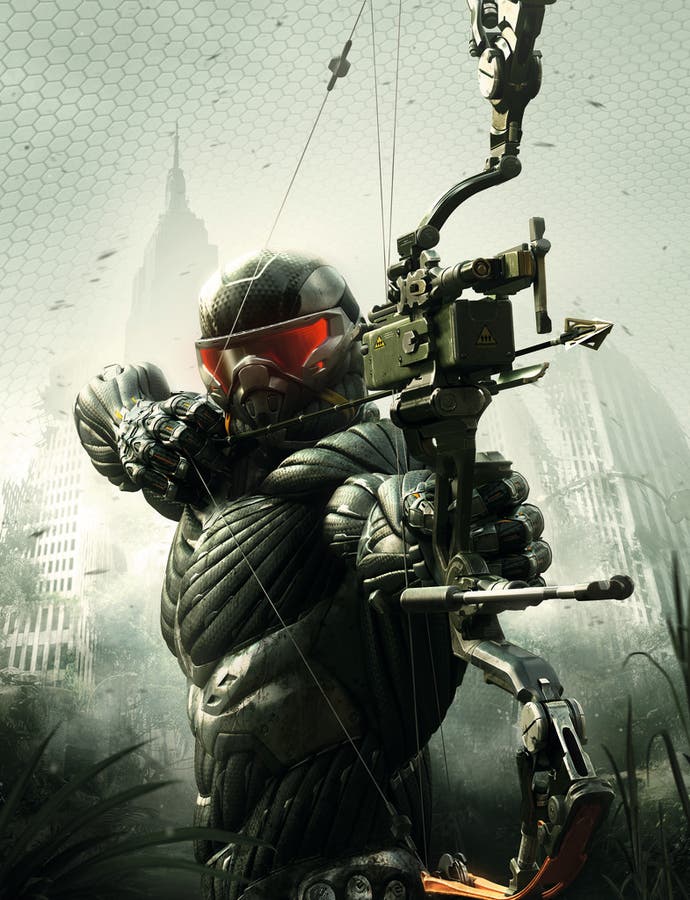
Another thing that's been suggested to me by current and former staff is Crytek expanded too fast. It opened too many studios too quickly and it tried to do too many things all at once, such as G-Face, The Collectables and Warface. Was expanding too fast a mistake?
Cevat Yerli: If things go right people say, wow, amazing. If many of them go wrong people say, wow, it was too fast. Retrospectively, when things go not entirely right you can say, yes, it was wrong. Would I do it again? I would, but slightly different. I can't elaborate on that right now. But I would not be very different in the behaviour. However, one of the reasons why we are focusing now is to be sure we have a strong foundation, instead of making dependencies on yet to come successes.
Even if you work within a company it's difficult to understand what's going on and why we are doing things. For example, a studio member in Frankfurt might wonder, what are the people in Kiev doing? And, why do we have people there? Or Kiev people say, why do we have people in Frankfurt? Internal communication is a challenge. But most people are focusing on the projects and trying to make them successful, instead of trying to figure out what the others are doing.
Prior to this, pretty much everybody was told where we were going during interviews. If somebody is concerned we might be going too fast, they usually either don't take the job or look at it differently.
We're not saying we are perfect by any means. There is so much room for improvement, but there is also so much learning going on right now. Learning that we are doing that many other companies yet have to do, and pain of growth that won't come again. We have learned now. We paid the price. Going forward it's going to be easier for us.
The pain of growth and the learning curve is something most other studios our size or not still have to undergo. We have been through this phase now.
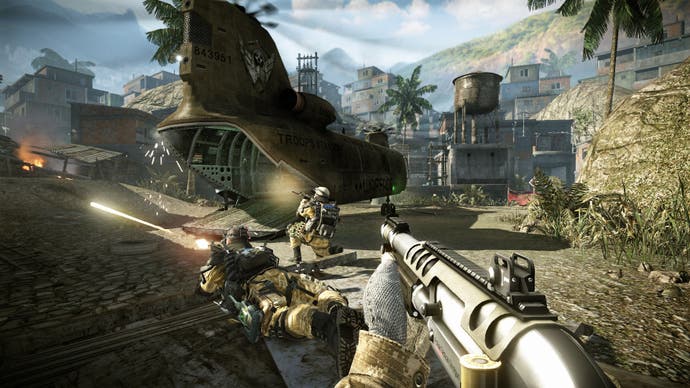
What about the decision to go free-to-play? Do you feel it's paid off? I know you're trying to improve Warface, but I understand it's successful in Russia but has flopped everywhere else.
Cevat Yerli: My goal always was, and still is, to make games that are free to come in and are more like a hobby to gamers. It's like going for a run. You can walk, run, start jogging and it's all free. But if you really want to get better in your hobby, if you turn it into a hobby, you start spending based on your own pacing. You turn your hobby into your lifestyle. And you share it with your friends. That's the premise that Warface, Arena of Fate and Hunt are working with.
Is Warface delivering this year? Not 100 per cent. But it's going to deliver, because we're going to do whatever it takes. We have 30 million registered users now. Whatever the team wants to get improved we'll make it, step by step, and invest to turn it into a hobby that people want to spend money at their own pace where they feel good about it.
Are we doing a perfect job on this right now? No. It's a learning curve for us. We are improving on this. Significantly. But our intention is a good one: to make it a fair experience, a service where we constantly improve things, constantly have updates and new content that is by base value for free. Warface for us as a company is successful. We have constant revenue coming in. And the only nation we really went big - and that's where it's successful right now - is Russia. We're going to go big in the west, but we're still ironing out core issues there because we can start spending on it. In Russia we ironed out the issues about one and a half years ago, and then we went big.
It's not like Warface was running and doesn't take off. We soft-launched Warface in certain territories. We are fixing core matters relating to the audiences. Once we've fixed our core matters, then we're going to spend on promotion. But from a development perspective our spending already continues. We did that in Russia one and a half years ago. So we're confident Warface in the west on Steam, once we have done a few more months of ironing out balance issues and game design matters people are responding strongly to right now and deliver what they want, then we will start promoting the game in a big way.
I remember when you announced to press a couple of years ago that you were going entirely free-to-play there was a lot of concern then. And now we see the problems Crytek has experienced. Can you understand the link between the two?
Cevat Yerli: I completely understand how people are following that kind of thinking. But my intention and my promise is benevolent in this. I do want the best for gamers and I do want to make the best service for gamers. I want to create game experiences that get better and better. Yes, online services need a lower spec experience to begin with. However, we're fully committed to making Warface a high end experience targeting high end gamers, same as with any game we do.
We are committed to a high quality with online and free-to-play games. But also we're committed to making them a fair hobby style experience. Every game is not there yet. In this case it's going under a lot of scrutiny to make sure it turns into a hobby and does not try to sell you something constantly.
We're gamers ourselves. We don't want to play an economical store font. We want to play a game I want to spend money in. I don't like the retail market because with retail games my experience is, when I buy a game sometimes just after one or two hours I feel like I made the wrong purchase. That should not happen with an online service. An online service should allow me to test the game. If you like it you could invite your friends, turn it into a hobby, and then you can start spending money if you want to. You don't have to spend money in our games.
Thanks for your time.
